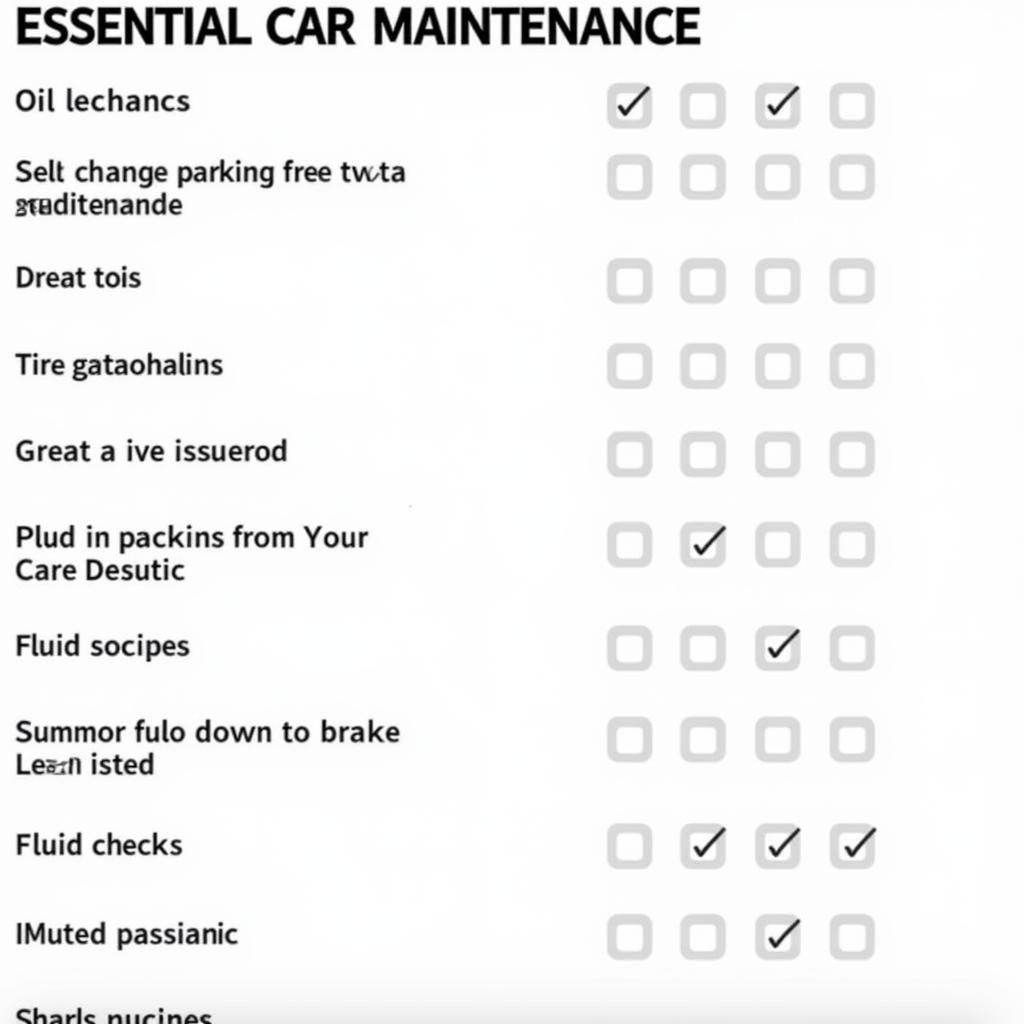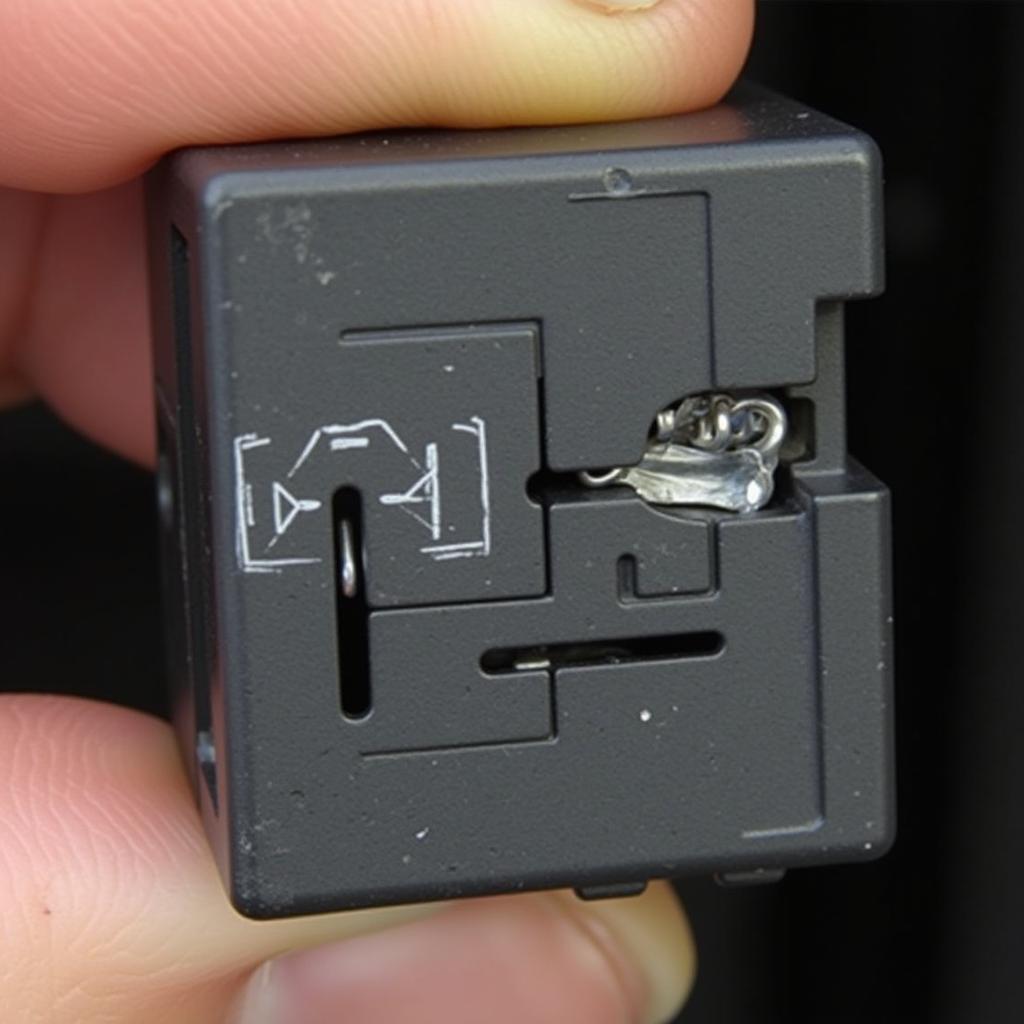Finding the right place for your car maintenance can feel like navigating a minefield. Do you opt for the dealership, an independent shop, or try tackling it yourself? This guide will steer you towards making the best choice for your vehicle and your wallet.
 Car Maintenance Checklist
Car Maintenance Checklist
Why Car Maintenance Matters
Before diving into the “where,” let’s address the “why.” Regular car maintenance is not just about avoiding breakdowns; it’s about:
- Safety: A well-maintained car is a safer car. Regular checks on brakes, tires, and lights can prevent accidents.
- Longevity: Consistent maintenance can significantly extend your car’s lifespan, saving you money in the long run.
- Resale Value: A car with a documented maintenance history holds a higher resale value.
- Fuel Efficiency: A well-tuned engine runs more efficiently, putting less strain on your wallet at the gas pump.
Dealerships: Pros and Cons
Dealerships often top the list when considering Where To Go To Car Maintenance, especially for new car owners. Let’s look at why:
Pros:
- Specialized Expertise: Technicians are trained specifically on your car’s make and model.
- Access to OEM Parts: Dealerships use Original Equipment Manufacturer (OEM) parts, ensuring quality and compatibility.
- Warranty Work: If your car is under warranty, the dealership is the go-to place for covered repairs.
Cons:
- Higher Costs: Dealerships often come with higher labor rates and part markups.
- Potential Upselling: You might encounter pressure to undertake unnecessary repairs or services.
Independent Mechanics: A Closer Look
Independent mechanics offer a compelling alternative to dealerships. Let’s weigh their strengths and weaknesses:
Pros:
- Personalized Service: Independent shops often provide more personalized attention and build relationships with their customers.
- Competitive Pricing: You can generally find more competitive labor rates and part options at independent shops.
- Flexibility: Independent mechanics might be more willing to work with you on payment plans or sourcing alternative parts.
Cons:
- Varied Expertise: The quality of service can vary significantly between shops.
- Parts Sourcing: While some use OEM parts, others may utilize aftermarket options, which can sometimes have quality variations.
DIY Car Maintenance: When It Makes Sense
For the hands-on car owner, tackling some maintenance tasks yourself can be both rewarding and budget-friendly.
Suitable DIY Tasks:
- Checking and Topping Off Fluids: Oil, coolant, brake fluid, power steering fluid, and windshield washer fluid levels are simple to monitor.
- Changing Air Filters: Engine and cabin air filters are relatively easy to replace.
- Replacing Wiper Blades: Worn wiper blades are a safety hazard and easily changed.
- Jumpstarting a Battery: Knowing how to jumpstart your car can get you out of a bind.
When to Leave it to the Pros:
- Complex Repairs: Anything involving engine work, transmission issues, or electrical systems is best left to trained professionals.
- Safety Concerns: Tasks that involve working with hazardous fluids or high-voltage components should be handled by experts.
- Lack of Experience: If you are unfamiliar with car mechanics, it’s always best to err on the side of caution and seek professional help.
Choosing the Right Fit: Factors to Consider
Your car maintenance needs are unique. Here’s what to consider when choosing between a dealership, an independent mechanic, or the DIY route:
- Car Age and Condition: Newer cars under warranty often benefit from dealership service. Older cars might be better suited for independent shops or DIY maintenance.
- Budget: Be realistic about your budget and compare quotes from different providers. Don’t be afraid to ask about payment options.
- Level of Trust: Choose a provider you feel comfortable with and trust to give you honest advice.
- Reviews and Recommendations: Online reviews and recommendations from friends and family can offer valuable insights.
Finding Reliable Car Maintenance Near You
Now that you have a clearer picture of your options, how do you find trustworthy car maintenance near you?
- Online Directories: Websites like Yelp, Google My Business, and Angie’s List provide reviews and ratings for local businesses, including car repair shops.
- Ask for Referrals: Tap into your network of friends, family, and colleagues for recommendations.
- Check for Certifications: Look for shops certified by the National Institute for Automotive Service Excellence (ASE).
Conclusion
Knowing where to go to car maintenance is crucial for keeping your vehicle running smoothly and safely. By weighing the pros and cons of dealerships, independent mechanics, and the DIY approach, and by conducting thorough research, you can find a solution that fits your needs and budget. Remember, a well-maintained car is a safe and reliable car, giving you peace of mind on the road.
Need help finding the perfect car maintenance solution? Contact AutoTipPro today at +1 (641) 206-8880 or visit our office at 500 N St Mary’s St, San Antonio, TX 78205, United States.
FAQs
1. How often should I get my oil changed?
The frequency of oil changes depends on your car’s make and model, as well as your driving habits. Refer to your owner’s manual for specific recommendations. However, a general rule of thumb is every 3,000 miles for conventional oil or every 5,000-7,500 miles for synthetic oil.
2. What are some signs of brake problems?
Common signs of brake issues include squealing or grinding noises when braking, a pulsating brake pedal, a spongy or soft brake pedal, and the vehicle pulling to one side when braking. If you experience any of these symptoms, it’s crucial to have your brakes inspected immediately.
3. How do I know if my tires need to be rotated or replaced?
Tire rotations are typically recommended every 5,000-7,500 miles to ensure even wear. You should replace your tires when the tread depth reaches 2/32 of an inch or if you notice signs of damage, such as cracks, bulges, or uneven wear patterns.
4. What is a car maintenance schedule, and why is it important?
A car maintenance schedule is a timeline for routine maintenance tasks, such as oil changes, tire rotations, and fluid checks. Adhering to a maintenance schedule helps prevent costly repairs, ensures optimal vehicle performance, and extends the life of your car.
5. Can I negotiate prices with car repair shops?
While some repair shops have fixed prices, it’s often possible to negotiate, especially for major repairs. Don’t hesitate to discuss pricing, compare quotes from different shops, and inquire about potential discounts.
6. What should I do if my car breaks down unexpectedly?
If your car breaks down, try to safely move it to the side of the road or a safe location. If you have roadside assistance coverage, contact your provider. Otherwise, call a tow truck to transport your vehicle to a trusted repair shop.





Leave a Reply